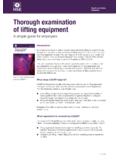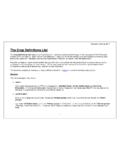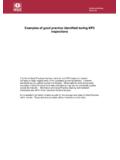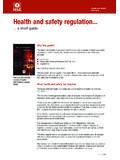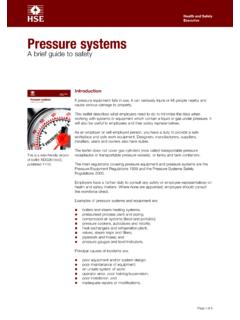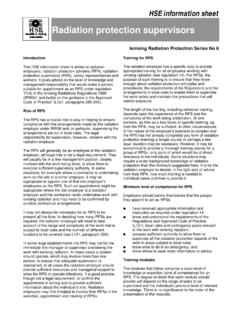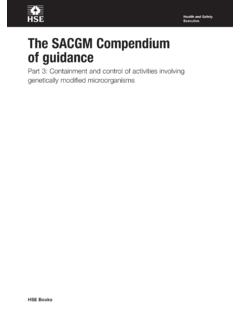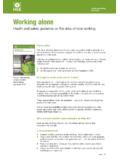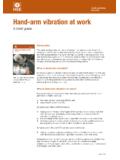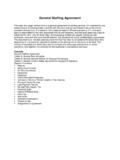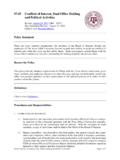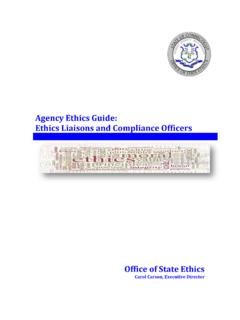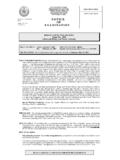Transcription of Striking the balance between operational and health and ...
1 health and Safety Executive1 of 5 pagesHealth and Safety ExecutiveStriking the balance between operational and health and safety duties in the Police ServiceStriking the balance between operational and health and safety duties in the Police ServiceForewordThis guidance is intended to clarify how health and safety law will be applied to the operational circumstances of the Police Service, as this has been a matter of understandable concern to them and to HSE. It is intended to assist senior police officers in balancing risks, particularly in their wider duties to fight crime and protect the public, while meeting their health and safety at work obligations to the public as well as their staff. HSE recognises that in doing so officers need to consider complex and competing legal and moral demands and to make tough decisions in what are often extremely dangerous, emotionally-charged and fast-moving situations.
2 HSE initiated joint work with senior police officers and other leaders to clarify how police services can strike the balance between their operational and health and safety duties . The result of this collaboration is set out in the set of principles, which are by their nature high-level and will be underpinned by practical guidance. Geoffrey Podger Judith HackittChief Executive ChairHSE HSE2 of 5 pagesHealth and Safety ExecutiveStriking the balance between operational and health and safety duties in the Police ServiceIntroduction1 There has been concern and misunderstanding about how police services can comply with health and safety legislation in their operational work given the often testing and difficult circumstances in which they are called to act. HSE is publishing this statement of principles to help police services, HSE inspectors and the public understand how the Police can comply with health and safety requirements to safeguard the health and safety of the public and their own staff while providing an effective emergency Senior police officers, other stakeholders, including representative bodies, and HSE have worked together in developing these high-level principles.
3 This statement will be supported by practical guidance. Through this collaborative work, the aim is to:help police officers, staff and the public understand the practical application of health and safety law to the operational activities of the Police Service;ensure consistency in approach and decision making by HSE inspectors; promote a culture within the Police Service where risks are dealt with in a sensible, proportionate and thought-through manner;set out the expectations on the Police Service in relation to the management of those of their operations that are dangerous, fast moving and emotionally charged; andprovide mechanisms for ensuring early and wide learning from incidents, new developments and challenges for the Police3 The application of health and safety law is challenging for the Police Service in relation to many of their operational activities because:they have to send officers and staff into dangerous situations in circumstances when anyone else would be seeking to get away from the danger;there is often an unrealistic public expectation that officers and staff will put themselves at risk to protect the public;they have to take into account the wider purpose of the Police Service, including public safety and the legal framework within which they operate and not act solely to protect their own officers and staff.
4 In fighting crime, the Police Service is, in effect, reducing the overall risk to the public however, in doing so, police activities may create other risks;many incidents they face occur without warning and individual officers may, from time to time, be confronted with situations outside their experience and training;police officers may need to take actions which put the public and themselves at risk. This is appropriate when the benefits from taking these risks outweigh the sum of all other risks;some of the incidents they deal with develop and change at speed; they have to prepare individual officers and staff to be able to make tough and complex decisions in foreseeable situations that may be dangerous, fast moving, emotionally charged and pressurised, even if there is incomplete or inaccurate information about the incident;they have to respond to dangerous situations which are not of their own making this is different to most other sectors where it is the employer s own business that creates the risks.
5 And3 of 5 pagesHealth and Safety ExecutiveStriking the balance between operational and health and safety duties in the Police Servicethey may not be able to control or mitigate all aspects of their working and safety duties4 In Great Britain, the health and Safety at Work etc Act 1974 (HSWA) applies to all activities of the Police Service. The primary duties under HSWA are on employers. Since 1998, chief constables are deemed the employers of police officers. The Police Authority or Joint Police Board is the employer of all other staff. 5 HSWA requires employers to ensure the health , safety and welfare at work of their employees and to ensure that their activities do not adversely affect the health and safety of other people. These health and safety duties are not absolute and each is qualified by the test of what is reasonably practicable. HSWA therefore, does not require all risks to be eliminated, and HSE recognises that, even when all reasonably practicable precautions have been taken to deal with foreseeable risks, injuries and deaths could still occur; and it may be necessary to take some risks to secure a wider benefit to public safety.
6 6 HSWA also places duties on employees to take reasonable care of themselves and others and to co-operate with their employer. In essence, this means that police officers and staff should act sensibly and responsibly within the command and control of their employer; they should not act recklessly. However, HSE recognises that in protecting the public, individuals may, very occasionally in extreme cases, decide to put themselves at risk in acts of true heroism. In these rare circumstances, HSE takes the view that HSWA has not been breached by the Service and that it would not be in the public interest to take action against the individual. Equally, HSE, like the Police Service, recognises that in such extreme cases everyone has the right to make personal choices and that individuals may choose not put themselves at unreasonable officers and staff should expect of the Police Service7 Good health and safety management systems that:take account of the bigger picture including the wider legal and regulatory context in which they operate, so that the Police Service can:fight crime and protect the public through delivery of an effective service; and enable officers and staff to take appropriate care for their own, their colleagues and the public s health and safety;include robust, proportionate, carefully considered and non-bureaucratic risk assessments which:identify significant risks.
7 Set out safe systems of work which specify appropriate control measures, equipment and competencies; and are effectively implemented. What the Police can expect from HSE8 HSE will continue to promote good health and safety management in the Police Service through a range of activities including:communicating and listening with/to key interested parties across the Police Service with a view to building and developing shared understanding of the issues that the Police face (eg through regular informal discussions and formal meetings);4 of 5 pagesHealth and Safety ExecutiveStriking the balance between operational and health and safety duties in the Police Serviceacting to ensure consistency of approach and in decision making by HSE inspectors in the light of these principles; working with key interested parties (eg employers, leaders, professional bodies, trades unions and staff representative associations) through joint initiatives (eg the development of these principles and the guidance to underpin them);supporting the work of and participating in key strategic fora; sharing information on the lessons to be learnt from incidents, technical developments, study or research; inspection and investigation where HSE inspectors will take appropriate action, as set out in HSE s Enforcement Policy Statement, these principles and underpinning guidance.
8 Such actions range from giving verbal and written advice, through the service of enforcement notices to prosecution; andtraining our inspectors to have an understanding of the often complex environment in which policing is The primary duties under health and safety law are on employers. HSE inspectors, when inspecting or investigating an individual Police Force using HSE s own procedures, including the Work Related Death Protocols, will consider:the adequacy of the Force s policies, risk assessments and procedures; if these policies are adequate, then the focus will be on how they are/were applied in practice this may be illustrated by the preparedness of the Force when dealing with foreseeable incidents;the extent to which the Force had control over the operational environment and the consequent dangers;how the actions taken measure up to what would be considered reasonable in the circumstances;the robustness of the command and control systems in place and used in operations;the extent to which any lack of preparedness actually contributed to the risks in particular circumstances.
9 The actual information about the incident that was available to officers and staff when they had to make operational decisions in what we recognise are sometimes dangerous, fast-moving and emotionally-charged environments, but not revisiting decisions made during operations with the benefit of information that could not reasonably have been known at the time;the quality of decision making at an incident as illustrating whether individuals have been adequately prepared for that incident by the Force;the wider public duties on the Police Service and the purpose of the operation and to what extent the risks that were taken were reasonable in the circumstances; andhow the Force prepared individual officers and staff for operational incidents, eg by training, provision of equipment and information on hazards, risk and of 5 pagesHealth and Safety ExecutivePublished by the health and Safety Executive 09/09 Further informationHSE priced and free publications can be viewed online or ordered from or contact HSE Books, PO Box 1999, Sudbury, Suffolk CO10 2WA Tel: 01787 881165 Fax: 01787 313995.
10 HSE priced publications are also available from information about health and safety ring HSE s Infoline Tel: 0845 345 0055 Fax: 0845 408 9566 Textphone: 0845 408 9577 e-mail: or write to HSE Information Services, Caerphilly Business Park, Caerphilly CF83 3GG. This leaflet is available at: Crown copyright This publication may be freely reproduced, except for advertising, endorsement or commercial purposes. First published 09/09. Please acknowledge the source as to Merseyside Police for use of the front cover image.
